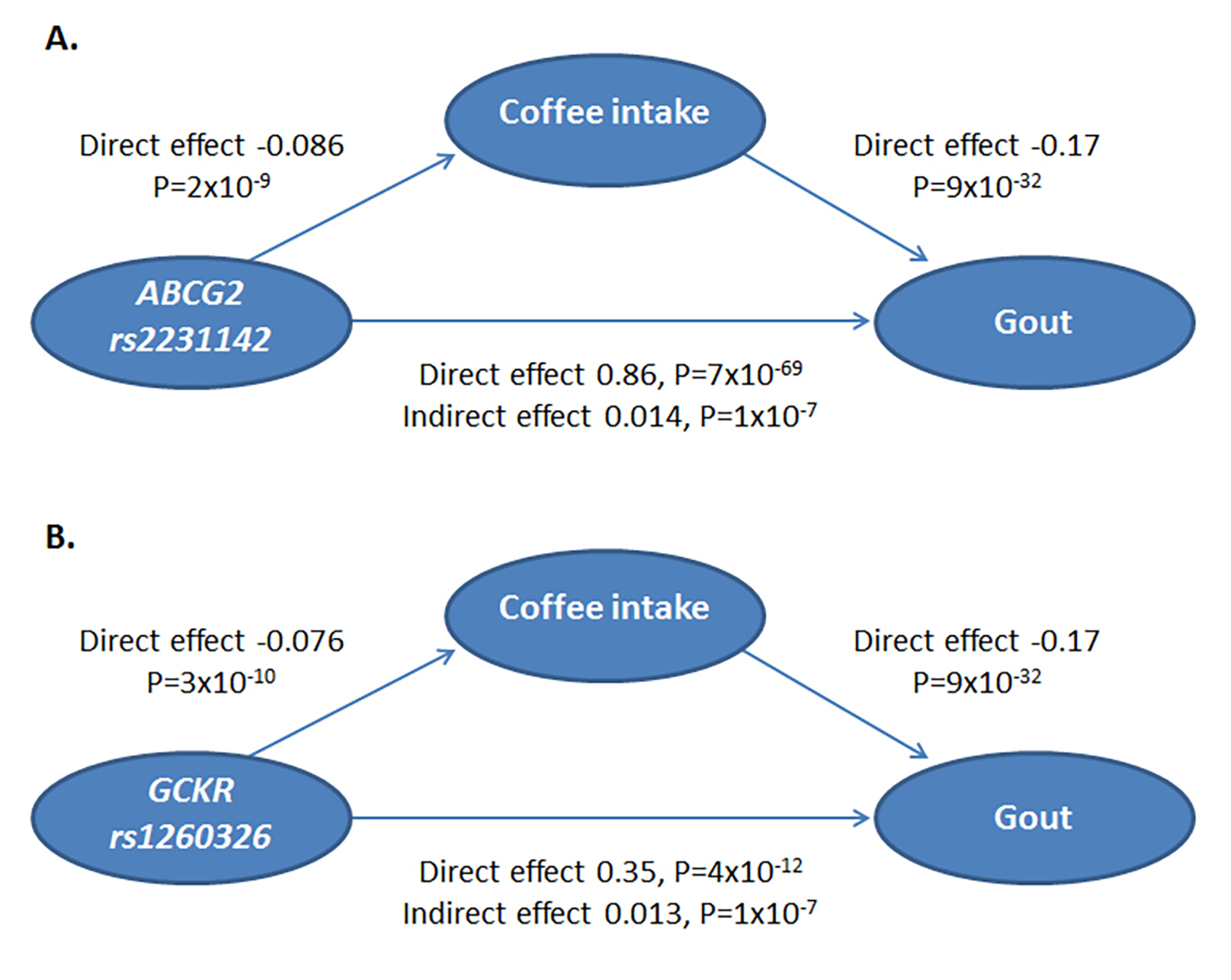Session Information
Session Type: ACR Poster Session C
Session Time: 9:00AM-11:00AM
Background/Purpose: Increased coffee intake is associated with reduced serum urate concentrations and lower risk of gout. Recent genome wide association studies (GWAS) have shown that genetic variants influence both coffee intake and serum urate. Specific alleles of SNPs in the ABCG2, GCKR, MLXIPL and CYP1A2 genes have been associated with reduced coffee intake and increased serum urate in separate GWAS. The aim of this study was to determine whether these SNPs influence the risk of gout through their effects on coffee consumption.
Methods: This research was conducted using the UK Biobank Resource (approval number 12611). Data, including genome-wide genotypes, were available for 130,966 European participants, aged 40-69 years. A validated case definition of ‘self-reported gout or urate-lowering therapy use’ was used to determine gout status. Gout status and coffee intake (cups per day) were tested for association with four SNPs: ABCG2 (rs2231142), GCKR (rs1260326), MLXIPL (rs1178977) and CYP1A2 (rs2472297) using regression models, adjusted for age, sex, body mass index, hypertension, kidney disease, diabetes mellitus, and intake of additional dietary factors. Total, direct or indirect standardized effect estimates of the causal association with gout were calculated and Sobel’s test was used to determine whether the indirect effect of each SNP on gout risk, mediated through coffee consumption, was significant.
Results: Coffee consumption was inversely associated with gout (multivariate adjusted odds ratio (95% CI) per cup consumed per day 0.85 (0.82 – 0.87), p = 9×10-32). The urate-increasing ABCG2, GCKR, MLXIPL and CYP1A2 alleles were associated with reduced daily coffee consumption, with the strongest associations for CYP1A2 (beta -0.35, p=8×10-40), and MLXIPL (beta -0.23, p=3×10-8), and weaker associations for ABCG2 (beta -0.11, p=2×10-9) and GCKR (beta -0.10, p=3×10-10). ABCG2 and GCKR were associated with gout at genome-wide significance (multivariate adjusted p<5×10-8 for both), but the association of MLXIPL and CYP1A2 did not achieve experiment-wide significance (multivariate adjusted p>0.0125 for both). In mediation analysis, the direct effects of ABCG2 and GCKR accounted for most of the total effect on gout risk, with much smaller indirect effects mediated by coffee consumption (Figure).
Conclusion: Lower coffee consumption is associated with gout. Although alleles at several SNPs associate with both lower coffee consumption and higher risk of gout, these SNPs largely influence gout risk directly, rather than indirectly through effects on coffee consumption.
Figure. Mediation analysis of A. ABCG2 and B. GCKR with gout, mediated by coffee consumption. Multivariate-adjusted standardised path coefficients are shown. The direction of the path analysis from SNP to gout risk was pre-specified.
To cite this abstract in AMA style:
Hutton J, Major T, Topless R, Merriman TR, Dalbeth N. Mediation Analysis to Understand Genetic Relationships between Habitual Coffee Intake and Gout [abstract]. Arthritis Rheumatol. 2017; 69 (suppl 10). https://acrabstracts.org/abstract/mediation-analysis-to-understand-genetic-relationships-between-habitual-coffee-intake-and-gout/. Accessed .« Back to 2017 ACR/ARHP Annual Meeting
ACR Meeting Abstracts - https://acrabstracts.org/abstract/mediation-analysis-to-understand-genetic-relationships-between-habitual-coffee-intake-and-gout/

